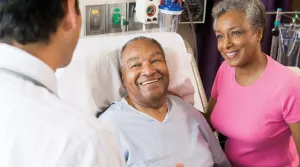Visitor information
Are you a family member planning to visit a loved one in the hospital? Information in this section includes visiting hours, nearby ATMs, discounted accommodations, places to eat and more.
Spiritual care
Interfaith chaplains are here to provide spiritual and emotional support to our patients, their loved ones, and our staff. We are available to assist and care for people of any religious tradition or spiritual identity. We can explore with you what holds meaning for you and incorporate this into your care as well as connect you with faith-specific resources and practices. If this would be helpful during your hospital stay, please contact us at 617.636.2500 or page 1211. Learn more
Ethics consultation services
The Ethics Consultation Service is available to assist families who may be facing difficult decisions regarding the care of their loved one.
Volunteer services
Volunteers at Tufts Medical Center in Boston visit inpatients daily helping with non-medical support services. For example, our volunteers bring complimentary newspapers, magazines, books, puzzles, playing cards and games to patients and their families. If you are a patient and are trying to reach volunteer services, please call 617.636.1377, Monday to Friday, 9 am to 5 pm.
Medical records
The Health Insurance Portability and Accountability Act (HIPAA) guarantees that all medical records are kept confidential. Patients may request their medical records at any time. Learn how to request your medical record.
Interpreter services
The Tufts MC Interpreter Services Program provides 24/7 access to interpretation to both our inpatient and outpatients. Learn about the languages available here. You can request an interpreter any weekday by asking the secretary on the unit to call 617.636.5547.
Pharmacy services
Tufts Medical Center has an in-house pharmacy that can fill all your prescription needs before you leave the hospital. We can service patients discharged from the hospital and also patients seen in our ambulatory clinics.
Case management
The case management team is comprised of the case manager and social worker. Their goal is to provide support for the patient/family/significant other throughout the hospital stay and during the discharge process.
Social work
The social work team helps you to enhance coping skills, communicate effectively with your other healthcare providers, gain access to resources and find solutions to a broad spectrum of problems.



